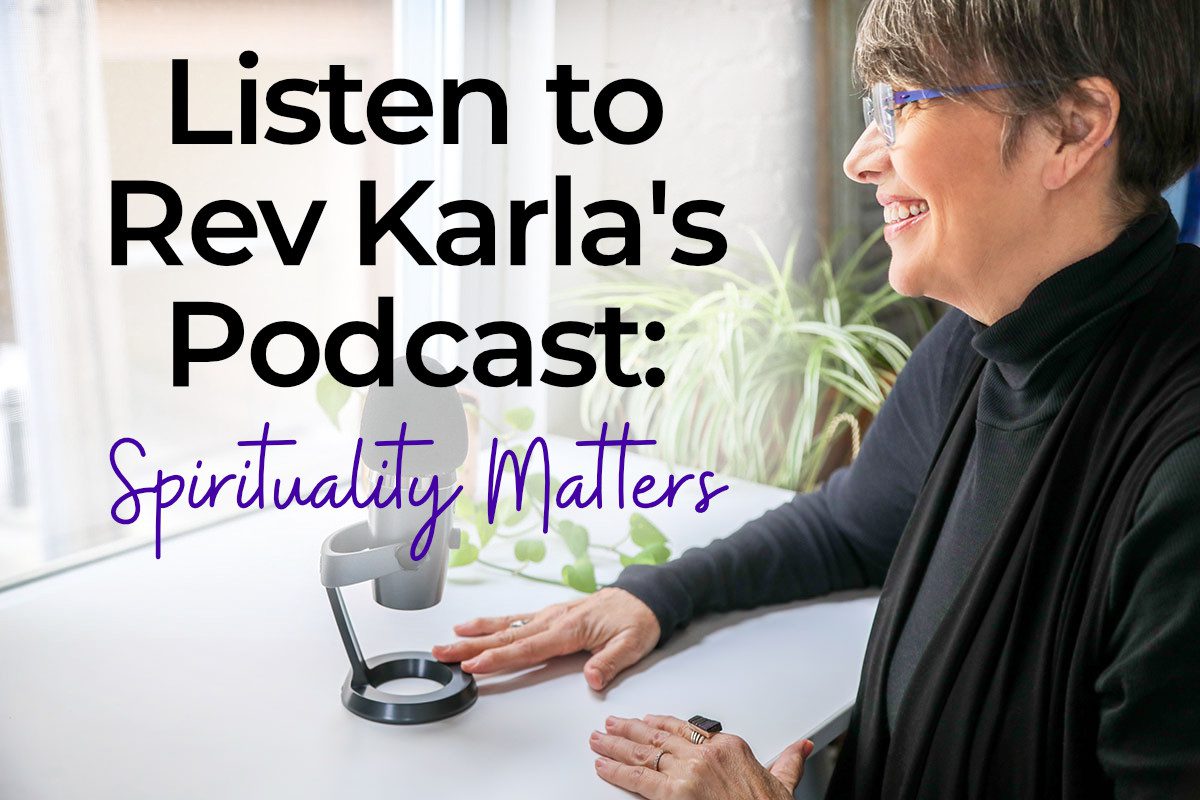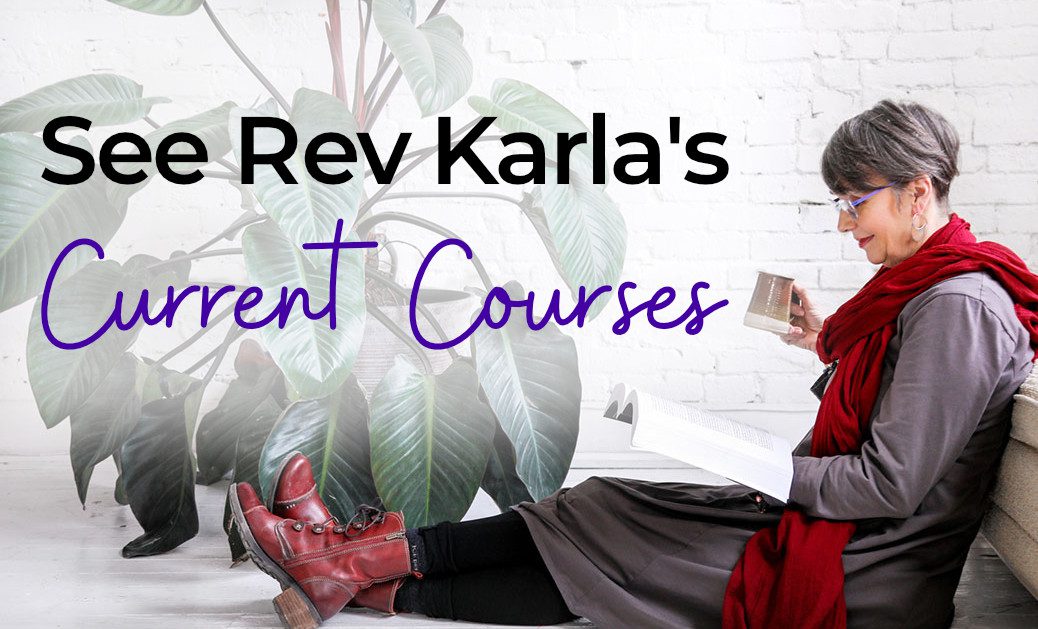
Using Your Voice for Good
I’ll never forget the day I went “viral” on TikTok. Imagine—me, a boomer who could barely navigate the app to post a video, let alone posting one that would eventually have millions of views.
I was frustrated with a writing project, and my business mentor had suggested that I remember who my audience was and what they needed. After some back and forth with her as she tried to narrow down my message, I blurted out, “Well ultimately I want to help people understand what it means to be spiritual but not religious.”
To that she responded, “Then write that! Teach that!”
I responded, “NO! That phrase is so overused and tired. It won’t mean anything to anyone.” More back and forth ensued, and I, who was now in the deep throes of hanger—anger mixed with hunger—I finally caved and said, “Fine. I’ll do a video about what it means to be spiritual but not religious.”
Then I sarcastically added, “Then I’ll show you that you are wrong!” To that she laughed—she was used to my stubbornness that often manifested in my pouting when I was acquiescing to her wisdom.
My desire for this little experiment to be over soon compelled me to ignore my hanger, and I set off to record a video with little thought about its content other than to explain what it means to be spiritual but not religious.
Picking a trending sound, I recorded myself pointing to the air where I would then place words describing the spiritual but not religious path. Literally 3 minutes later, the video was recorded, edited and posted. Now it was time to satisfy the hunger and prepare my “See I told you” to my business mentor when the video I just posted failed to generate the responses she had hoped I would receive.
Except that isn’t what happened. Almost immediately after posting the video, my notifications on my phone began to ping. My team and I were in the middle of launching some projects, so this first wave of notifications didn’t seem out of the ordinary. Also, I was new to TikTok and had my notifications set to ping me, because I was enjoying engaging with the handful of people who were responding to my content.
One of my grandchildren was here, and he too noticed the repetitive pinging and said, “Tata, someone really needs to get in touch with you.” Still, I ignored it until the rapid fire of the notifications became alarming. I asked my grandson to check the notifications for me, and he exclaimed, “Tata, did you post a video, because those are all TikTok notifications!”
He handed me my phone, and sure enough, within 15 minutes of posting that video, there were hundreds of notifications showing likes, shares, comments and new followers. As I started to scroll through the notifications, I read comment after comment from people who said things like:
“I’ve never heard this phrase before, but I feel like you see me. Please explain more.”
“Thank you so much for sharing. Now I have words for how I feel.”
“Instant follow! I love this so much.”
“Where were you when I needed to explain why I was leaving church?”
On and on the comments flowed, with more coming in each and every minute. Within days, my modest following of a few hundred had grown to over 25,000 followers, and as they say, the rest is history.
More viral videos would follow, and I am still amazed and honored at how my follower count continues to grow. But without that not-so-gentle nudge from a business mentor, I would have missed what was staring me right in the face….
people desire to reclaim their spirituality outside the construct of organized religion.
And I was ready to help them on their journey.
Now that we’re a couple of years down the road from that first viral video, I remember to post a video periodically to remind people what it means to be spiritual but not religious. I’ve also stopped assuming that I know what resonates with those who are desiring to reclaim their spirituality in healing and sacred ways. (Oh, and I thanked my business mentor for giving me advice that was spot on!)
This writing is intentionally written to be simple and practical for those of you who are just entering the path to reclaiming your spirituality or healing from your religious trauma. If you are ready to dive deeper into the spiritual-but-not-religious path, you can find information about courses and events here.
- Spirituality does not need religion’s approval to exist. This concept offers a huge paradigm shift, especially for those whose religious indoctrination compelled them to believe that their spirituality was not “God approved” if they were not in church. This is, with all due respect, utter nonsense. Spirituality can and does exist outside the construct of organized religion. Many of us were taught to believe that if we weren’t in church, we weren’t being good Christians. A pastor at our former church even told one of my relatives that her son could miss “the blessings of heaven” if they didn’t have him in church. This is spiritual manipulation, and sadly very common among church leaders who imply that their church is somehow a conduit to saving one from eternal damnation. The truth is religion is a human-made construct. In its purest form, this religious construct should enrich and nurture our spirituality. For many people, it does. Sadly, however, the church became corrupt when church leaders discovered the power that lies in controlling the spirituality of humans. This has been seen throughout history when some facets of Christianity weaponized their beliefs and aligned with political operatives to oppress the rights of humans. This has led to people leaving church, rejecting the hypocrisy in those church leaders and seeking spirituality outside this corrupt construct. Still others leave because they feel like church no longer serves their highest good. Regardless of their reasons for leaving, spirituality outside of organized religion is just as sacred and meaningful.
- A person’s spirituality is as unique as our DNA. Spirituality was never supposed to be considered a “cookie cutter” aspect of our lives. This is why some people who are leaving church report they are doing so because they feel that church no longer serves their spirituality. Organized religion often packages spirituality into things to do: tithe, attend worship, volunteer for unpaid labor at church, invite new people to church, don’t miss special events, and so on. There’s nothing wrong with any of those activities, but they aren’t what makes us spiritual. Those activities are done because you desire to be in community with and supportive of those with like minds who are seeking a similar connection. Being spiritual is much simpler than what we do—it is who we are. This means that we should be encouraged to seek unique ways that nurture our individual spirituality even if we belong to a spiritual community.
- No one religion or spiritual path is the “true” path. I recently interviewed a dear friend of mine who is a former evangelical pastor. We met when I first began teaching online. He had left the ministry and had just begun his deconstructing journey. We discussed what he used to believe as an evangelical pastor, and he shared that he not only believed that Christianity was the only true path, he thought that his church alone held all the truths for salvation—no other church was right except his. Of course, he no longer believes this (thank goodness!). But it isn’t far-fetched to say that this is more common than you know, and it occurs in all aspects of religious beliefs. This is extremist thought, and it is not only arrogant, but it is dangerous. I too used to believe that Christianity was the only true religion, and everyone else was going to hell for rejecting Christianity’s message. Looking back, I can see how arrogant that belief is. To assume that a religion that emerged in one tiny speck of the world was to somehow spread to the point of world dominance was a teaching that contorted scripture to serve patriarchal power structures. Nothing more.
- Spirituality existed long before religion. For centuries, humans have been seeking answers to existential questions. The answers continue to elude us. Thankfully, we are no longer offering human sacrifices to appease the gods of volcanoes or to ensure a successful harvest. But historic evidence suggests that curiosity and wonder compelled our ancestors to honor the changing seasons and to express gratitude for abundance. Those practices evolved as science revealed the secrets of the universe, and organized religion began to formulate rituals and community to coalesce around shared thoughts and beliefs. The oldest world religion, Hinduism, dating back to 15th century BCE and originating in India, was the start of human’s attempt to formalize religious thought. Christianity is a relatively new religion compared to the oldest world religions, so to imply that religion is the only way to “be spiritual” negates the entirety of the human experience that existed, and still exists, outside the construct of organized religion.
- Just being alive is being spiritual. Probably the most simple yet controversial concept of the spiritual-but-not-religious path is the assertion that just being alive—being here, breathing and existing in this physical plane—is spiritual. Spirituality is that simple. Yet we have often been made to believe that it is more about what we do, rather than who we are. The truth is that one’s proximity to any religious construct is meaningless if all it is teaching you is how to wield your judgment and moral superiority over another. This can never be reconciled with anything close to spirituality—it is merely a power play by church leaders that weaponizes beliefs to oppress others who don’t look like, love like, or believe like they do. Indeed, any spiritual teachings or practices should help you turn back to your life a better version of yourself and equip you to work toward the good of the whole and leave the world a better place because you were in it. But the most sacred and vital part of your spirituality is sitting with yourself to discover what is inside you that needs light so that you can begin the work to heal what’s broken and to release what no longer serves your highest good.
Beloved, I won’t pretend to know all the answers about what it means to be spiritual but not religious. No one can, and I’d run as fast as I could from someone who asserts they do have the answers. Spirituality is less about knowing the answers with 100% certainty and more about sitting with the questions.
Some of them may never be answered—that is okay.
It is my belief they never were intended to be. That is where we humans got it wrong all along.
If I can leave you with one thought, it is this…
Spirituality is not contingent upon anyone’s or religion’s approval.
Remember that your spirituality is as unique as your DNA, and I encourage you to explore the spiritual but not religious path.
It is safe here.
It is sacred here.
All are welcome.
No one is turned away.
Just as it was always supposed to be.
Blessed be.


